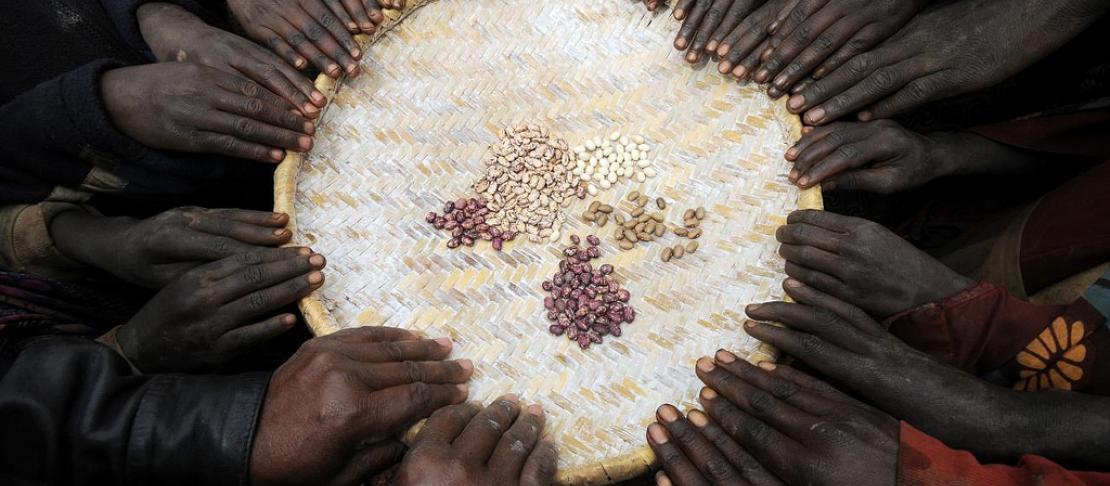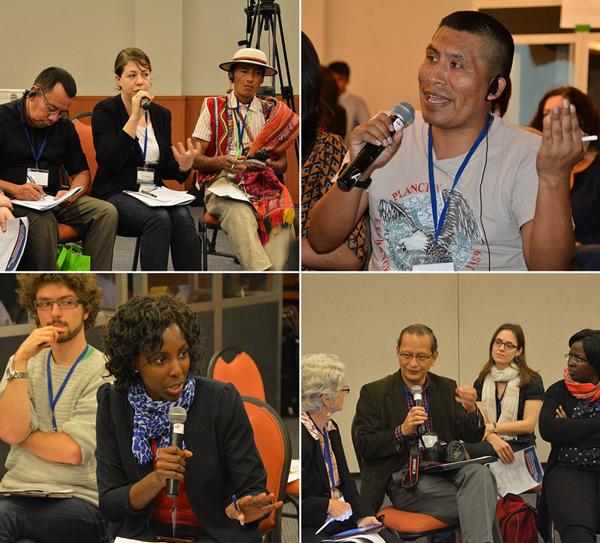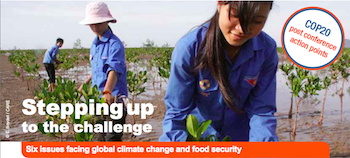Delivering action on food and nutrition security in an age of global climate disruption

Report back from the Seminar on Food and Nutrition Security, Agriculture and Climate Change which took place on 7 December in Lima, Peru
Peruvian farmers need no reminder about the challenges of increasing agricultural production in a rapidly shifting climate. As they battle heat extremes, flash frosts and rapidly melting glaciers, Peru’s food producers are already under pressure to feed a growing and increasingly urban population in the face of climate change.
So this year’s UN climate conference in Lima (COP20) provided an apt location for discussions about the unfolding food and nutrition security crisis, not just in Peru, but worldwide.
Watch: Participants speak on how to move ahead
As the impacts of climate change multiply, what should the global research community, civil society, governments and businesses do to step up to the agriculture and food nutrition security challenge? That was the question facing 120+ delegates at the Seminar on Food and Nutrition Security, Agriculture and Climate Change held on the fringes of COP20 by the CGIAR Research Program on Climate Change, Agriculture and Food Security (CCAFS), CARE and the Technical Centre for Agricultural and Rural Cooperation (CTA) .
Opening the session, Sonja Vermeulen, Head of Research for CCAFS, noted that agriculture is “everywhere and nowhere in the UNFCCC process.” It is a cross-cutting issue affected by, and with impacts on, many other critical issues under discussion, yet it is rarely given the prominence it deserves. Here was a chance, she said, to move beyond generic statements of principle and intent towards tangible actions that deliver real change.
Read the Issues paper: updated with key actions post COP20
To provide a frame for the event, and to kick-start the discussion, six key critical issues around productive capacity and long-term viability of smallholder farmers were circulated in advance as a ‘starter for ten’ in a joint CARE, CCAFS and CTA issues brief.
As scientists, NGO workers, indigenous farmers, community organisers, government representatives and academics exchanged views through a series of breakout groups, keynote addresses and question and answer sessions, a number of headline issues began to emerge.
First, there was a clear sense that smallholder farmers, and their contribution to the global economy is, as yet, hugely undervalued in the UNFCCC process.
Smallholders are feeding the majority of the world’s population, and already battling climate change impacts on a daily basis, but receive scant recognition for their efforts or contributions to the global economy.
Whether in El Salvador, Peru or East Africa, it is often smallholders in developing countries who are the innovators when it comes to climate change adaptation and resilience, often using their local knowledge to overcome challenges including drought or plant illness. Smallholders’ unique contribution remains to be recognised in the UNFCCC’s corridors of power.
In terms of finance, delegates had just as much to say. There was a strong feeling that money for agriculture urgently needs to shift to the frontline, so it can be accessible to the people who need it most.
As Bruce Campbell, Program Director for CCAFS put it:
“Finance for agriculture is a critical issue. Currently it’s going to large-scale, unsustainable commercial farming rather than smallholders – the question is, how do you get the money to where it needs to go? What we need are really creative ways to reach millions of farmers, global, national and local, without the associated transaction costs at every point.”
Delegates agreed that innovative mechanisms such as village savings and loans groups and microfinance, combined with building local level adaptive capacity, are just some of the ways to help ensure smallholders have access to the financial resources they will need as climate impacts worsen.
On top of that, there is a critical need to remove agricultural subsidies. Not only do subsidies play a significant role in contributing to climate change through large-scale extractive agriculture, they also undermine sustainable development, delegates noted.

THROUGH A SERIES OF BREAKOUT GROUPS, KEYNOTE ADDRESSES AND QUESTION AND ANSWER SESSIONS, A NUMBER OF Key Actions BEGAN TO EMERGE. Photos: S.Kilungu (CCAFS) More photos...
Alongside financial resources, smallholder farmers also need far more decision-making power, and need to be included in dialogues about policies which affect them, delegates said. As the number of mouths to feed rises, by approximately 2bn by 2050, farmers must become part of the global food security conversation. As stressed by Oluyede Ajayi, senior Programmes Coordinator of CTA, there is need to “provide enabling policy environment and finances to scale up proven practices and technologies that help farmers to address the challenges of climate change”
As Susan Kandel, Senior Researcher at PRISMA (El Salvador) explained, it’s about making actions right for the context and the place. “Territorially-rooted solutions” need to be owned locally and implemented locally, she said, before adding that farming communities and civil society are starting to push for such solutions as part of a package of measures to tackle food security in Central America’s Dry Corridor.
Equitable outcomes for women were also high on the agenda.
Tackling gender requires that men and boys are engaged. The changes could come about through new tools of social structural analysis of the cultural assumed gender roles which need to change .
Rights and access to credit.
We need innovative mechanisms of getting finance, especially private finance, from global and national institutions to farmers; mechanisms that both cut down on transaction costs and ensure more equitable and pro-poor outcomes, e.g. through mobile banking or through local savings and credit groups. By making access to finance inclusive, we can achieve scale and improve equity.
Integrated efforts, under-nutrition and malnutrition failure in other sectors, need integration.
Confronting these issues requires putting nutrition on the agenda - include nutrition in the current discussions of climate change: at international, national and regional (within the country) levels. More political will is needed and civil society has an important role to play in pressuring and monitoring political will and implementation of policies.
What happens next?
As governments finalise their draft 2015 climate agreement here in Lima, there was a clear sense that agriculture needs to remain high on the UNFCCC’s agenda. So the key question, as one delegate put it, is not only why or how, but who?
Who is going to carry forward these critical issues and actions around agriculture over the coming 12 months and beyond to ensure real and tangible steps are taken to safeguard food and nutrition security on the road to Paris?
In the words of CCAFS Bruce Campbell,
the challenge is to us all; to farmers, NGOs, scientists, academics, governments and civil society. Now is the time for us to recognise what we can do in our own sphere - and to make it happen.
As one delegate concluded: “In short, climate change provides the imperative for system change.” If we are to truly feed the global population in a world impacted by growing climate disruption, system change is starting to look like our best, if not only, option.
Written by Kit Vaughan, Director of Environment and Climate Change, and Jo Barrett, Press and Communications Coordinator at CARE International.
CCAFS and partners were at the UN Climate Talks in Lima in December 2014 to share experiences and insights on agriculture and food security. Find out more and join the conversation online by following our COP20 blog, @cgiarclimate on twitter, on Facebook and Google+.

